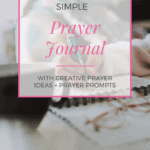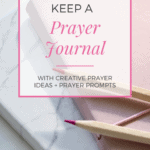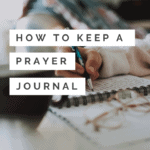Let’s face it: regular, daily prayer can be hard. Remembering to pray for those to whom you’ve offered to pray… Remembering to pray, and finding the motivation to get the heck up off the couch, at the end of a hard day filled with house work, child care, a job, and social time – near impossible!
A prayer journal is a handy little tool to help keep us on track with our prayer lives: Keep track of people you need to pray for. Keep track of answered prayers. Get creative with your prayers and find a prayer method that speaks to you.
Here is an easy way to start a simple prayer journal, as well as prompts and prayer methods to help get your creative talking-to-God, and listening-to-God, juices flowing.
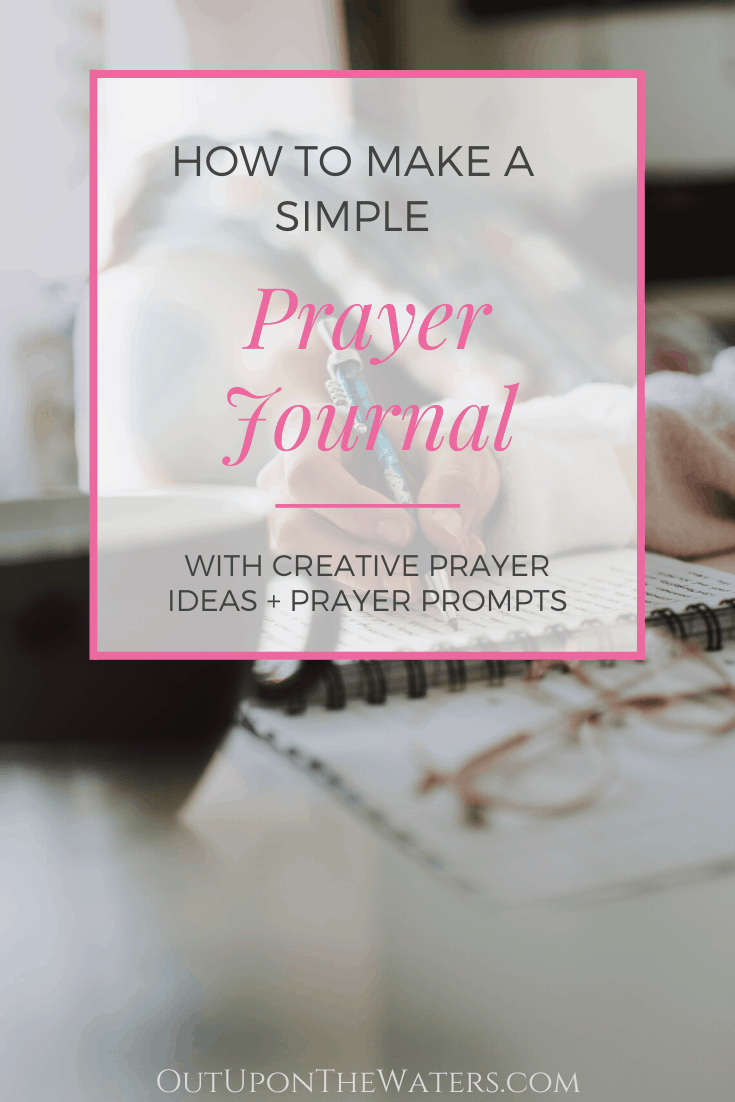
What is a Prayer Journal?
A prayer journal is really just a handy little book that helps you to keep track of your prayers.
You can buy fancy prayer journals that include daily devotionals, Scripture passages, and prayer prompts. But you can also make your own simple prayer journal for just a few cents – or buy a blank notebook from just about anywhere – and keep track of your daily conversations with God.
- You can try out different prayer methods in your prayer journal, and see which kind of prayer resonates with you.
- You can record your thoughts and write letters to God.
- You can keep track of people for whom you’ve offered to pray, and any answers to prayer that you are made aware of.
Why Keep a Prayer Journal?
Keeping a prayer journal is a great way to keep track not just of the things that you need to pray for, but of the answers that you receive.
The number of times that I have gone back over my prayer journal and discovered answers to prayer that I have since forgotten is amazing!
I’ll give you just one example. Just about a year ago, I had a minor car accident in a parking lot: when pulling into a spot, I misjudged the distance and scratched someone else’s car with my car. My conscience was shouting at my that I couldn’t just leave; I had to leave a note. So I left a note.
Soon after, I got an angry text from this person. This prompted a full-on crisis of faith in me. I did a bit of research and discovered that the cost to fix the scratch could be thousands of dollars (thousands of dollars I didn’t have) if the scratch went all the way down to the metal and went across two doors. The owner of the other car was really angry and insisted that the damage was serious. And of course, I was so upset by the whole incident that I left a note but I didn’t think to take a picture before I left – so I only had her word to go on.
Why did this happen to me? Why did I have to leave a note? That was the killer thing. If God forgives sins, then what does it pay to do the right thing? I should have just driven away. God would forgive me. I don’t have thousands of dollars! All those things swirled around my head.
So I wrote all this down in my prayer journal, complete with the “Why, God?!” crisis.
The very next day, during my morning Bible study and devotional, I received quite an astounding direct answer to my “Why?!” prayers.
It was as though God was listening.
Of course he was.
And so I recorded that answer in my prayer journal as well.
And the double layer of blessing that comes with keeping this journal is this: Not only do I have a conversation with God, and get answers to prayers on a fairly regular basis, but I have a record of those.
So now, years later, when I forget all the things that God has done for me (and I do forget a lot of them!) I can go back and read about all the times that God has been faithful in my life.
It is like having my own little altar of stones as a memorial to the things that God has done for me.
And I have to tell you: there have been prayers that have been answered so thoroughly, and struggles that I was going through swept away so completely, that I have later completely forgotten about them. If not for my record of God’s workings in my life, I would easily forget many the times when he came through for me.
Keeping a prayer journal has transformed my faith in God and my confidence in him. And it can do the same for you.
Reasons to keep a prayer journal:
- Gives structure to your prayer time.
- Makes it easy to keep track of people and things you want to pray for.
- Makes it more like a conversation between you and God. You speak (write), and then listen, and record any answers you receive.
- Makes you more attentive to what God is doing in your life.
- Functions like your own personal altar of stones: a reminder of what God has done in your life.
- Allows you to see more answers to prayer in your life, especially when answers are a long time in coming or involve gradual change.
Prayer Journal Ideas
Starting a prayer journal can be a little bit intimidating if you don’t know what to write. (Hello writer’s block! Does that blank page scare anyone else, or is it just me?)
Here are a collection of ideas to get you starting with prayer journaling. Pick any one of these prayer journal ideas, try it out for at least a few days, and see what speaks to you.
A quick prayer tip: finding a type of prayer that you like will make it so much more likely that your prayer habit will stick.
So try out a few ideas. Keep the ones that resonate with you. Discard the ones that you find too cumbersome, and the ones that just fall flat.
- Record the names of people for whom you’ve offered to pray; leave space to record answers to those prayers.
- Record prayer requests and date them. How many times have you prayed for something and then completely forgotten about it afterwards? I know that happens to me all the time. Writing down your prayers and dating them makes sure that you don’t forget about them afterwards, and it gives you a concrete record of what God is doing in your life. I’ve gone back over dated prayer requests quite often and completely forgotten not only that I’d asked to that thing, but I’d also forgotten that God answered that prayer so completely. Without a record, answered prayers are easy to forget. (Especially the everyday not-a-life-changing-emergency sort of answers.)
- Record answers to prayer. This seems fairly self-evident, but if we don’t record answers to prayer, we can quite easily forget them. Recording answers gives you a record of God’s faithfulness in your life, which can give you confidence whenever you face uncertainty, doubt, and suffering in the future.
- Start a list of blessings in your life. Record each thing that you are thankful for. As you build your list, you’ll discover that there are countless little blessings in your life!
- Try out the Doodle Prayer. Draw your prayers…sort of. This is a perfect prayer to do in a little DIY prayer journal. In fact, I think that this is my favourite one. It’s short, it’s creative, and you can do it anywhere.
- Write letters to God. Just like a diary, but begin your reflections with “Dear God”. I’ve used this method to talk to God about my day, about my fears and anxieties, any challenges I’m facing, and to make requests. It’s amazing to go back over these letters from weeks or months, or even years ago, and see how God has been working in your life.
- Try out the Everyday Prayer or the ACTS prayer and record your observations in your prayer journal.
- Write out key Bible verses that speak to you either during our prayer time or during your Bible study time. This will help to reinforce your Biblical knowledge, and it will also help you to see patterns in your life that God may be trying to make clear to to you.
- If you receive encouragement, a vision, or prophecy from someone else, record this in your journal. God often speaks to us through other people, and if we don’t keep track of what He’s saying, it’s easy to forget, and to miss things that God wants to point out to us. There have definitely been times in my life when I have received a prophetic word from someone else that was worth keeping track of!
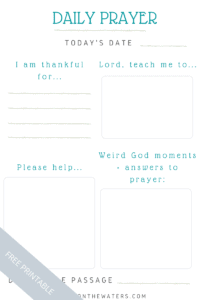
If you want some structure to your prayer time, you can download your free prayer journal template here. It includes space for thanksgiving, for requests and confessions (Lord, help me to…), petitions (for others or for yourself), and answers to prayer and cool God moments.
It also includes space for a daily Bible passage – because God often speaks to us (and answers prayer) through Scripture.

